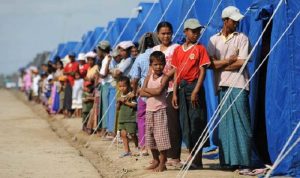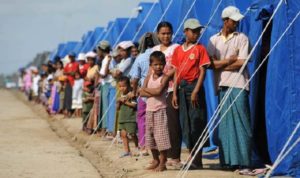
Rohingya Refugees Living In India Optimistic About 9 April Supreme Court Verdict
Rohingya people who have taken refuge at the Budena Gaon camp in New Delhi, are quite optimistic on the 9 April Supreme Court verdict over their stay in India.

“Those who come to help us have told that there is a case filed for us in the court to enable our stay here. I am praying to the Almighty that the verdict is in our favour so that we can stay back here safely,” Nurul told during an interview.
On behalf of Democratic Youth Federation of India (DYFI), Subash Chandran, a lawyer, has filed a case in the supreme court citing that as India has signed 1989 UN Convention for Rights of Child in 1992, it is not allowed for India to deport the Rohingya children.

“As India has ratified the Convention, it will be the violation of Articles 2, 6, 7, 19, 20, 22, 31 and 37 of the UN Convention on the Rights of the Child,” said Chandran.
There are currently around 12,000 Rohingya children living in refugee status living in India.
The government had announced earlier that it was planning to deport all 40,000 Rohingya refugees staying in the country.
The government had told the Supreme Court on 18 September 2017, in an affidavit that the continued illegal immigration of Rohingyas to India had “serious national security ramifications and threats”.
It also claimed that inputs from security agencies have given indication that some of the refugees had pre-established links with terror groups in Pakistan.
The lawyer had said that such deportation after knowing very well that the people/children being would be killed in transit/on reaching the country of their origin also would amount to the violation of Fundamental Rights guaranteed to such people under Articles 14 and 21 of the Constitution of India.
“Article 2 of the Convention on the Rights of the Child mandates the signatory state to uphold the spirit of all the articles in the Convention and to apply it regardless of child’s nationality even,” the lawyer said adding that if the if he wins the case on children, then it will put the government in a fix.
“If the court says the government not to deport the children, then their parents also can stay back isn’t it?” the lawyer asked.
Nurul and his other ten-member family, including three brothers, four sisters and father and mother, had to walk for atleast seven continuous days to reach India.
“We were afraid of getting killed in Myanmar riots. Even though food, jobs for my parents, education for me and my siblings is a problem in India, at least we are safe here. We don’t want to go back,” said Nurul.
You May Also Read: Survivors And Kin Still Wait For Compensation After Four Months Of Cyclone Ockhi